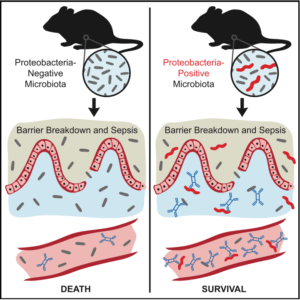Classical understanding of antibody functions state that IgG and IgA antibodies confer protective systemic and mucosal immunity, respectively. However, IgA antibodies have been observed in the sera of mice, a findings that contradict textbook immunology. Willmore et al., aimed to determine the functional and protective role of serum IgA.
Researchers studied serum IgA immune responses between their own specific-pathogen free C57BL/6 (B6) (PENN-SPF) mice and Jackson Laboratories B6 (JAX-SPF) mice. Their results showed that PENN-SPF mice had significantly higher levels of serum IgA than JAX-SPF mice. They also observed that when PENN-SPF and JAX-SPF mice were cohoused, JAX-SPF mice had similar IgA antibody levels as PENN-SPF. This increase was attributed to a change of the microbiome of cohoused JAX mice, where cohousing resulted in colonisation of Proteobacteria phylum including helicobacter species, bacteria absent in non-cohoused JAX-mice. This was further confirmed by inoculation of JAX-SPF mice Helicobacter muridurum, which also resulted in increased levels of serum IgA and IgA secreting bone marrow plasma cells. Thus, clearly illustrating a relationship between microbiome composition and induction of serum IgA.
Finally to determine if serum IgA can protect against polymicrobial sepsis, Willmore et al., used an experimental mouse model known as cecal ligation and puncture (CLP) to induce sepsis. When CLP was performed of PENN-SPF and JAX-SPF mice, JAX-SPF mice were more susceptible to infection resulting in >85% death compared to <20% death in PENN-SPF mice. Susceptibility of JAX-SPF mice following CLIP was greatly improved when JAX-SPF mice were cohoused with PENN-SPF mice for 10 weeks. This improved survival was attributed to the presence of serum IgA induced by the microbial community present in PENN-SPF mice.
In summary, this research showed that levels of serum of IgA depends on composition of the gut microbiota. Presence of Proteobacteria results in induction of serum IgA antibodies that provide protection against lethal bacterial sepsis due to intestinal barrier disruption.
Journal Article: Willmore et al., 2018. Commensal Microbes Induce Serum IgA Responses that Protect against Polymicrobial Sepsis. Cell Host & Microbe
Article by Cheleka AM Mpande












